Otthof Hofcafé — Eurasburg, Germany

Eurasburg, Germany 🇩🇪
The Bavarian country shows its glamor to prospectors —those who seriously look for natural beauty. I was told about the beauty of Bavaria many times. When I experienced it myself, I fell in love deeply. There is a sense of laid-backness in the sole and greenness of this part of Germany. It is both admirable and pleasant to the prospecting visitor.

Mountains and lakes, alpine pastures, flower meadows and pastures, inns and churches. The typical Upper Bavarian backdrop you’d expect.
— bavaria.travel
In my trip visiting Europe a few years ago, my hub was the Munich Airport. I made my plans to spend a few days in the Bavarian country before my outbound flight back home. I picked my stay at a lovely town called Eurasburg, where I spent four days and three nights. I was so charmed by the Austrian country, spending the days before in that part of Europe. Still, Germany was able to charm us the same.

Eurasburg is a municipality in Oberbayern. It is situated about 40 kilometres south of the Bavarian state capital, Munich, in the county of Bad Tölz-Wolfratshausen. Since the redistricting reforms of 1978, the municipality of Eurasburg has had an area of 40.9 square kilometres, which includes 52 communities.
— Wikipedia
Otthof Hofcafé — Pin 📍
In another future trip to Eurasburg, I would ensure I visit a place that gives a good scoop of the Bavarian country. In searching for such a place, I found “Otthof” a great place to consider. It is both a home and a cafe, situated on the green hills, with spectacular panoramic views of the beautiful surroundings.

The Hofcafé, founded in 2016, is our heart. Surrounded by idyllic nature and with a breathtaking view of the Alps, your visit to us is guaranteed to be unforgettable. Enjoy cakes, tarts and our coffee specialties made by Rosi, or strengthen yourself with a small snack and a an ice cream. You will find space on the terrace with a panoramic view or in a cozy atmosphere in our wheelchair-accessible interior.
— Otthof Web
This is a place where you can live the laid-back attitude that is known about this part of Germany. If you happen to be living a serious life all year long, tormented by life and work demands, then a spot like this can give you the chance to loosen a bit. The fact that it is both good as a homestay and a cafe makes it perfect for disconnecting from the outside world completely. The open space around the cafe and the playground can also be much enjoyable for a family retreat.




Self —Lost & Found
We all know the “lost & found”, a facility that can be seen in public places such as airports, malls, stations, parks, ... etc. It is often mandatory to be provided by the facility. And, it is usually assuring to visitors to see this kind of service. We also know how much trouble people get, physically and mentally, when they lose items and seek services of not-well-attended lost & found desks.
But, what about a psychological kind of lost & found? Wouldn’t it be great to seek shelter or places when we lose touch with ourselves? Wouldn’t it be great to be able to stop by a desk, or a mirror for that matter, describing ourselves one way or another, in a try to claim them back? I am sure it is part of our humanity that we lose ourselves at certain stages in our lives. Some might be blessed for not experiencing that. Others are also considered blessed if they do, because it is a signal to regain their lives back.
Losing oneself comes at times in the sense that one might hardly recognize it. You become busy living, forgetting to actually live. You become concerned by the sidelines of life, and forget the main highlights and experiences that give life its meaning. Accepting the fact that you might lose yourself is one thing. Being able to find it again is a totally different thing. But I hope if you happen to lose yourself, you do not end up on chaotic “lost & found desk”, psychologically speaking.
I am not sure about you, but in my case, I found forcibly stopping and disconnecting is a great way for me to find myself after being lost. Making the forced stops and pauses a habit, protects you from losing yourself ever again. Regular journaling and reflecting is also a great way to immunize yourself. Make it a habit, and you would never become in need for a sole “lost & found”.
How to Stop Time: A Novel
Tom Hazard has lost his sole and was able to find it again, with love. His fictional story is depicted beautifully in the novel “How To Stop Time” by Matt Haig. The voice of Matt that is full of wisdom, and his craft of writing, made this a great read for me. I have enjoyed the idea of being aging over centuries. I have also enjoyed the fact that living a really long life is not necessarily a good thing. Quality wins over quantity, like many of us know for a fact.

How to Stop Time: A Novel
Tom Hazard has just moved back to London, his old home, to settle down and become a high school history teacher. And on his first day at school, he meets a captivating French teacher at his school who seems fascinated by him. But Tom has a dangerous secret. He may look like an ordinary 41-year-old, but owing to a rare condition, he's been alive for centuries. Tom has lived history--performing with Shakespeare, exploring the high seas with Captain Cook, and sharing cocktails with Fitzgerald. Now, he just wants an ordinary life.
Unfortunately for Tom, the Albatross Society, the secretive group which protects people like Tom, has one rule: Never fall in love. As painful memories of his past and the erratic behavior of the Society's watchful leader threaten to derail his new life and romance, the one thing he can't have just happens to be the one thing that might save him. Tom will have to decide once and for all whether to remain stuck in the past, or finally begin living in the present.
How to Stop Time tells a love story across the ages—and for the ages—about a man lost in time, the woman who could save him, and the lifetimes it can take to learn how to live. It is a bighearted, wildly original novel about losing and finding yourself, the inevitability of change, and how with enough time to learn, we just might find happiness.
The passage that hit me strong is quoted below. It is both realistic and accepting, and so human of us. Although we might wish to live longer lives, it appears having shorter ones is much better for us.
“For a point. It occurred to me that human beings didn’t live beyond a hundred because they simply weren’t up for it. Psychologically, I mean. You kind of ran out. There wasn’t enough self to keep going. You grew too bored of your own mind. Of the way life repeated itself. How, after a while, there wasn’t a smile or gesture that you hadn’t seen before. There wasn’t a change in the world order that didn’t echo other changes in the world order. And the news stopped being new. The very word ‘news’ became a joke. It was all just a cycle. A slowly rotating downward one. And your tolerance for human beings, making the same mistakes over and over and over and over again, began to fade. It was like being stuck in the same song, with a chorus you had once liked but now made you want to rip your ears off.”
― Matt Haig, How to Stop Time
On the acceptance of humanity:
“The longer you live, the more you realise that nothing is fixed. Everyone will become a refugee if they live long enough. Everyone would realise their nationality means little in the long run. Everyone would see their worldviews challenged and disproved. Everyone would realise that the thing that defines a human being is being a human.”
― Matt Haig, How to Stop Time
On the simplification and realization of how to live morally:
“People talk about a moral compass and I think that is it. We always know the right and wrong for ourselves, the north and south. You have to trust it, Anton. People can tell you all kinds of wrong directions, lead you around any corner. You can’t trust any of that. You can’t even trust me. What do they say in car adverts? About the navigation system? Comes as standard. Everything you need to know about right and wrong is already there. It comes as standard. It’s like music. You just have to listen.”
― Matt Haig, How to Stop Time
On the effect of material life, and the trending obsession of needing more:
As far as I can see, this is a problem with living in the twenty-first century. Many of us have every material thing we need, so the job of marketing is now to tie the economy to our emotions, to make us feel like we need more by making us want things we never needed before. We are made to feel poor on thirty thousand pounds a year. To feel poorly travelled if we have been to only ten other countries. To feel too old if we have a wrinkle. To feel ugly if we aren’t photoshopped and filtered.
― Matt Haig, How to Stop Time

Member discussion